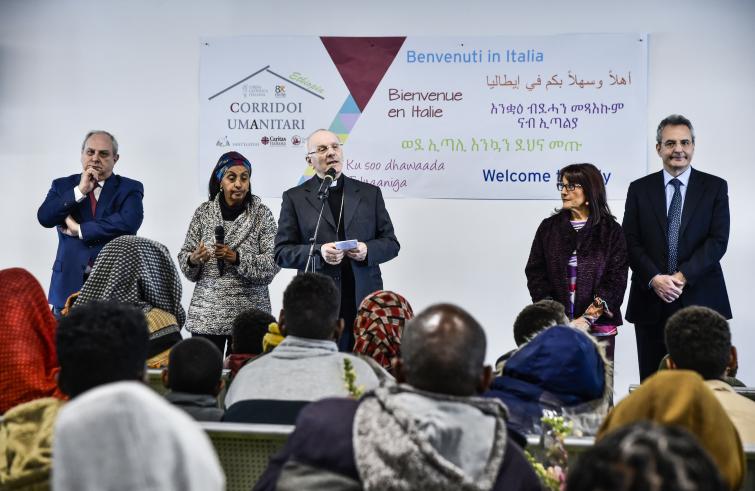Reportage from Addis Ababa
Ongoing uncertainty and suspension in Ethiopia where the state of emergency was extended for another six months after the surprise resignation, in mid-February, of Premier Hailemariam Desalegn. A journey among Catholics and humanitarian organizations working for the poor and for refugees

(from Addis Ababa) Although the Ethiopian government has found accommodation for 10,000 street children wandering throughout the capital, Ethiopia has an extremely high rate of poverty, under everyone’s eyes to see. Among the high and modern downtown buildings, meant to showcase a modern and developing metropolis, while many others are under construction amidst uncomely “made in China” skyways, it is evident that Africa is still struggling, with the short breath of those arriving from abroad and not yet accustomed to the altitude of Addis Ababa, 2,200 meters above sea level. The city centre is full of wooden and tin shacks; people stand on long lines at bus stops; the streets are dusty and full of potholes, unemployed youths hang around doing nothing, poor people sleeping on the pavement are seen begging in the street despite the government ban.
This is in sharp contrast with the flaunted luxury of five-star hotels of large international chains that pamper the circles of the few rich and the thousands of expatriates from international organizations. Hotels thus serve as points of reference in a city whose streets are without names.
There are at least 175,000 street children nationwide, while the extreme poverty rate is of approximately 30% on a total of 102 million inhabitants, 10 million of whom are in urgent need of food.
Most of them are young people (250 million in 2050 according to forecasts), and although GDP is at approximately 6% , unemployment rates remain extremely high. Addis Ababa has 3 million inhabitants according to official figures, 10 million according to others, including the suburban slums that house internally displaced people.
The political crisis and the state of emergency. There is an ongoing situation of uncertainty and suspension. The state of emergency has been extended for another six months after the surprise resignation, in mid-February, of Premier Hailemariam Desalegn in an effort to facilitate reforms critical to the establishment of democracy and peace. For the past two years government repression in the Oromia and Amhara regions, representing the population majority, led to over 300 dead. The Oromo and Amhara people protest over border-related issues and socio-economic inequality since political and economic power is dominated by the Tigrayan minority (6% of the overall population). The government has released hundreds of political prisoners, but rather than being viewed as a sign of dialogue and détente it has been interpreted as a sign of weakness.
Now the new government is awaited with apprehension; the amount of risk it will entail depends on the ethnicity of the premier.
The political crisis affects everyone: Internet services are suspended every now and then, the population is requested to remain inside the capital’s urban area, foodstuffs transport is difficult, prices surge, demonstrations are banned. The Country is locked down with armed forces carrying kalashnikovs at every corner.
 The Cardinal of Addis Ababa: “Address ethnic issues.” “Ethnic problems should not be swept under the carpet. All issues should be put on the table and discussed”, said Cardinal Berhaneyesus d. Souraphiel, Catholic archbishop of Addis Ababa, commenting on the political situation. His Eminence received us in the archbishopric adjacent to St. Mary Covenant Cathedral, a few steps away from a mosque. Catholics in Ethiopia are only 0.7% of the overall population. 46% are Ethiopian Orthodox, 33% are Muslim. Orthodox chants resound across the city morning and evening, alternated with those of the muezzin. During the Muslim prayer the road near the Catholic compound is blocked with the rugs of those praying facing the direction of Mecca.
The Cardinal of Addis Ababa: “Address ethnic issues.” “Ethnic problems should not be swept under the carpet. All issues should be put on the table and discussed”, said Cardinal Berhaneyesus d. Souraphiel, Catholic archbishop of Addis Ababa, commenting on the political situation. His Eminence received us in the archbishopric adjacent to St. Mary Covenant Cathedral, a few steps away from a mosque. Catholics in Ethiopia are only 0.7% of the overall population. 46% are Ethiopian Orthodox, 33% are Muslim. Orthodox chants resound across the city morning and evening, alternated with those of the muezzin. During the Muslim prayer the road near the Catholic compound is blocked with the rugs of those praying facing the direction of Mecca.
“The great challenge – the Cardinal pointed out – is to build peace among the different ethnic groups and work for one same Country,
addressing the problem of unemployment that afflicts young people, favouring small enterprises, fighting against the trafficking of arms and human beings.”
The commitment of Caritas Ethiopia. Solidarity in Ethiopia in expressed in many forms all to the benefit of the local population and for over 900 000 refugees who are generously welcomed into the Country: Eritreans, South-Sudanese, Yemenites, Somalis, internally displaced people. Caritas Ethiopia, for example, is active on various fronts. These include the fight on the trafficking of human beings in conjunction with a national task force. It seeks to prevent the exploitation of domestic workers in particular, seen that many Ethiopians who work in Arab Countries are victims of various forms of abuse and situations of difficulty. Saudi Arabia has recently decided to repatriate 450.000 Ethiopians, 250.000 have already returned. “In cooperation with the Salesian Fathers we organize formation courses and media campaigns to prevent illegal migration – said Bekele Moges, executive director of Caritas Ethiopia -, along with projects to create new job opportunities and educational activity in refugee camps.” Mario Mesay, from the Migrations office of Caritas Ethiopia, confirmed that thanks to their advocacy activity “migration policies have improved across the years: refugees don’t have to pay school fees anymore and are not forced to live in the camps. The next goal to be achieved by 2020 is inclusion and the dismantling of refugee camps.”

For one-and-a-half years he lived like the poor of Addis Abeba. Notable personalities involved in the area of humanitarian assistance include Yemane Woldemarian Berhe, 53, founder of the El Shadai Association (“God is Almighty”), Orthodox Christian. He had moved to Canada with his wife and his one-month baby to complete his studies, until he took the life-changing, almost Gospel-inspired decision: to leave everything and live
one and a half years amidst the poor of Addis Ababa, begging alms to understand what it really means to be hungry, to never be able to wash and always wear the same dirty clothes.
“It was the only way to have a first-hand experience of poverty – he said -. I discovered that street children are poor but intelligent. They are honest and straight-forward.” Yemane tried asking for the government’s help: “Leave them alone, there is nothing you can do”, was the reply. He rolled up his sleeves and gave children the opportunity to study and work. He set up two hostels for these children in the Tigray region, in Gambella, Hafar and Addis Abeba, until the government realized that something could actually be done. Since then the project receives government co-sponsorship. In 30 years El Shadai removed from the streets at least 7.000 children, 25.000 have been introduced in the working environment. Also his son, who is over 18 today, left Canada to assist refugees in
the Gandhi charity, an NGO for Eritrean refugees. The El Shadai organization works in close cooperation with Gandhi charity, an NGO founded and directed by Alganesc Fessaha, ayurvedic physician who lives in Milan, recipient of international recognition (including, inter alia, Milan’s Ambrogino d’Oro Award in 2013 and the Focsiv Volunteer Prize in 2017). In a few days she will be leaving for Israel to plant a tree and be conferred the recognition as Righteous person. Alganesh was born in Asmara and was forced to flee Eritrea. Since then her life has been entirely devoted to Eritrean refugees, helping also those who fall prey of traffickers in the Sinai or in Libya’s detention centres. Gandhi charity was founded in 2003 in Abidjan, Ivory Coast. Hundreds of volunteer workers – Italians and Eritreans – work in its seats located in Milan and in Addis Ababa. In the past years Gandhi charity helped 33 thousand youths graduate and it ensured 2800 distance adoptions. It is present also in refugee camps in Ethiopia, including Mai Ayni, in the Tigray region, where volunteers distribute 850 meals every day. 
“We want poor children to have the opportunity to study and continue living in Ethiopia”, Alganesh said. In Ethiopia she was personally involved in the humanitarian corridors project that on February 27 brought to Rome 113 Eritrean, South-Sudanese and Somali vulnerable persons, now hosted in 18 Italian dioceses. A total of 500 will arrive into the Country thanks to the Memorandum of Understanding between the Church and the Italian State, with the Community of Sant’Egidio. They will be hosted by seventy diocesan Caritas. The overarching goal is autonomy and integration.